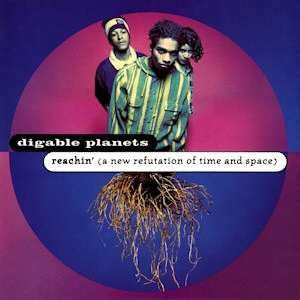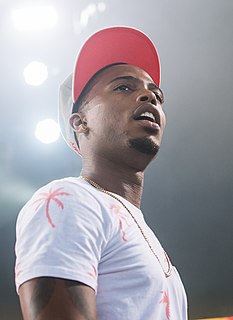Latin hip hop or Latin rap is hip hop music recorded by Latin American artists in the U.S. and Spanish-speaking countries in the Caribbean, Central American and South America.
Trip hop is a musical genre that originated in the early 1990s in the United Kingdom, especially Bristol. It has been described as "a fusion of hip hop and electronica until neither genre is recognizable", and may incorporate a variety of styles, including funk, dub, soul, psychedelia, R&B, and house, as well as other forms of electronic music. Trip hop can be highly experimental.
The music of the United States reflects the country's pluri-ethnic population through a diverse array of styles. It is a mixture of music influenced by West African, Irish, Scottish and mainland European cultures among others. The country's most internationally renowned genres are jazz, blues, country, bluegrass, rock, rhythm and blues, soul, ragtime, hip hop, barbershop, pop, experimental, techno, house, dance, boogaloo, and salsa. The United States has the world's largest music market with a total retail value of 4,898.3 million dollars in 2014, and its music is heard around the world. Since the beginning of the 20th century, some forms of American popular music have gained a near global audience.
West Coast hip hop is a regional genre of hip hop music that encompasses any artists or music that originate in the West Coast region of the United States. The gangsta rap subgenre of West Coast hip hop began to dominate from a radio play and sales standpoint during the early 1990s with the birth of G-funk and the emergence of Suge Knight and Dr. Dre's Death Row Records.
Alternative metal is a rock music fusion genre that infuses heavy metal with influences from alternative rock and other genres not normally associated with metal. Alternative metal bands are often characterized by heavily downtuned, mid-paced guitar riffs, a mixture of accessible melodic vocals and harsh vocals and sometimes unconventional sounds within other heavy metal styles. The term has been in use since the 1980s, although it came into prominence in the 1990s.

African-American music is an umbrella term covering a diverse range of music and musical genres largely developed by African Americans. Their origins are in musical forms that arose out of the historical condition of slavery that characterized the lives of African Americans prior to the American Civil War.
Popular music of the United Kingdom in the 1980s built on the post-punk and new wave movements, incorporating different sources of inspiration from subgenres and what is now classed as world music in the shape of Jamaican and Indian music. It also explored the consequences of new technology and social change in the electronic music of synthpop. In the early years of the decade, while subgenres like heavy metal music continued to develop separately, there was a considerable crossover between rock and more commercial popular music, with a large number of more "serious" bands, like The Police and UB40, enjoying considerable single chart success. The advent of MTV and cable video helped spur what has been seen as a Second British Invasion in the early years of the decade, with British bands enjoying more success in America than they had since the height of the Beatles' popularity in the 1960s. However, by the end of the decade a fragmentation has been observed, with many new forms of music and sub-cultures, including Hip Hop and House music, while the single charts were once again dominated by pop artists, now often associated with the Hi-NRG hit factory of Stock Aitken Waterman. The rise of the Indie rock scene was partly a response to this, and marked a shift away from the major music labels and towards the importance of local scenes like Madchester and subgenres, like gothic rock.
The music history of the United States includes many styles of folk, popular and classical music. Some of the best-known genres of American music are blues, rock and roll, and country. The history began with the Native Americans, the first people to populate North America. The music of these people was highly varied in form, and was mostly religious in purpose.
Hip hop soul is a subgenre of contemporary R&B music, most popular during the early and mid 1990s, which fuses R&B/gospel singing with hip hop musical production. The subgenre had evolved from a previous R&B subgenre, new jack swing, which had incorporated hip-hop influences into R&B music. By contrast, hip hop soul is, as described in The Encyclopedia of African American Music, "quite literally soul singing over hip hop grooves".
Popular Hungarian hip hop is popular among the inner city/urban population in Hungary. Performers include a gangsta rap pioneer, Ganxsta Zolee, his local fellow Dopeman, L.L. Junior and Sub Bass Monster.
Golden age hip hop is a name given to mainstream hip hop music created in the mid/late 1980s and early 1990s, particularly by artists and musicians originating from the New York metropolitan area. It is characterized by its diversity, quality, innovation and influence on hip hop after the genre's emergence and establishment in the previous decade. There were various types of subject matter, while the music was experimental and the sampling from old records was eclectic.
Political hip hop is a subgenre of hip hop music that was developed in the 1980s as a way of turning rap music into a call for action and a form of social activism. Inspired by 1970s political preachers such as The Last Poets and musician Gil Scott-Heron, Public Enemy was the first predominately political hip-hop group. It has helped to create a new form of social expression for subordinate groups to speak about their exclusions, injustices and lack of power. Political hip-hop is the use of hip hop music to send political messages to inspire action or to convince the listener of a particular worldview. There is no all-encompassing political hip-hop ideology; rather, there are multiple perspectives that range anywhere from Marxism to the values of the Five Percent Nation.
Austrian hip hop is not a genre of hip hop music, but covers all hip hop music from Austria. The majority of Austrian hip hop acts does Underground hip hop, as the big radio stations in Austria have no airtime for native hip hop. The only radio station that does so is FM4, which focuses on alternative music.

Hip hop music, also called hip-hop or rap music, is a music genre developed in the United States by inner-city African Americans in the late 1970s which consists of a stylized rhythmic music that commonly accompanies rapping, a rhythmic and rhyming speech that is chanted. It developed as part of hip hop culture, a subculture defined by four key stylistic elements: MCing/rapping, DJing/scratching with turntables, break dancing, and graffiti writing. Other elements include sampling beats or bass lines from records, and rhythmic beatboxing. While often used to refer solely to rapping, "hip hop" more properly denotes the practice of the entire subculture. The term hip hop music is sometimes used synonymously with the term rap music, though rapping is not a required component of hip hop music; the genre may also incorporate other elements of hip hop culture, including DJing, turntablism, scratching, beatboxing, and instrumental tracks.
LGBTQ representations in hip hop music have been historically low. Hip hop has long been portrayed as one of the least LGBT-friendly genres of music with a significant body of hip hop music containing homophobic views and anti-gay lyrics. However, since the early 2000s there has been a flourishing community of LGBTQ hip hop artists, activists and performers breaking barriers in the mainstream music industry.
This article describes trends in popular music in the 2010s. See also: 2010s in the music industry.
Comedy hip hop or comedy rap, is a subgenre of hip hop music that is comedic in nature, often incorporating satirical lyrics. While many examples of comedy hip hop could be considered a parody of the hip hop genre, in the case of artists who merely incorporate humor into their more serious, purist hip hop styles, such as Eminem and Ludacris, this is not necessarily the case.













